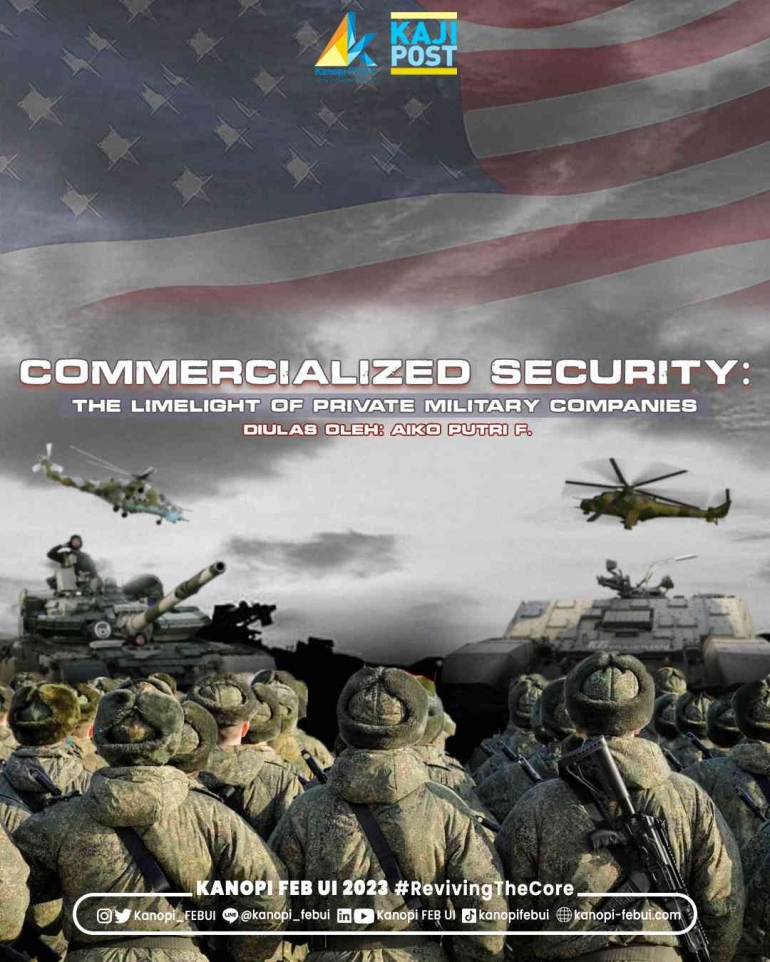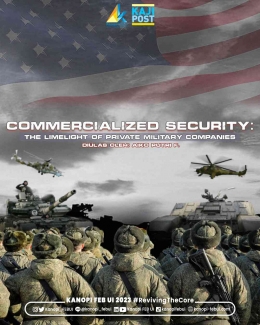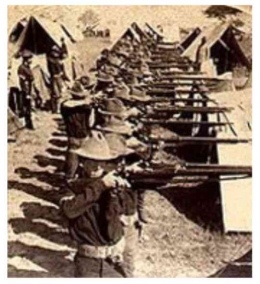Do you know how America became a global superpower? Well, dissecting the tale would take days. Long story short, American expansionism, which of course did not occur overnight, is one of the biggest revolutions in world history. Starting with the battles of Lexington and Concord until World War II, the United States showed practically all of the characteristics of a great power; it stood ahead or nearly ahead in terms of population, geographic size and location on two oceans, economic resources, and foremost, military power.

The modern United States is the most powerful country in human history with over 800 military bases and 37% of global military spending. In 2022, the US spent roughly $800 billion on its defense. That is more than China, India, the United Kingdom, Russia, France, Germany, Saudi Arabia, Japan, and South Korea combined.
Due to its superiority in terms of security and the military, America was able to retain its position as the world's superpower while continuing to actively manage international affairs. In a similar manner, in order to retain their hegemonic positions in world affairs, Russia and China also continue to build up their armed forces.
Now, what would happen if the military and security were privatized? Privatization of force alters who is a superpower. So suddenly we are getting into a world where the super-rich can become superpower, say, by the middle of this century, ExxonMobil can have its own army. Likewise with Elon Musk.
Private warfare is coming back into the 21st century, as it has always been in human history. Who are these mercenary groups, and why are they making a comeback?
What is a "Mercenary"?
Global in scale, private security has grown to be a huge business. No one truly knows how many billions of dollars slosh around this illicit market. Business is blooming, that much is certain. Major mercenary activity has been observed recently in Yemen, Nigeria, Ukraine, Syria, and Iraq. As evidenced by the conflict in Syria, many of these for-profit warriors are superior to local militaries, and some of them can even compete with America's most elite forces.
Who exactly qualifies as a "mercenary" is a subject of debate among experts. Due to the stigma attached, those in the industry, their clients, and some outside experts avoid using the "M" word and instead refer to these private-sector fighters as private military contractors, private security companies, private military companies, private security/military companies, private military firms, military service providers, operational contractors, and contingency contractors.
In simplest terms, a mercenary is an armed civilian paid to do military operations in a foreign conflict zone. Mercenaries are distinguished from military and armed non state actors like terrorists by the fact that their primary motivations are profit rather than politics. Large private military businesses have even had their stock traded on Wall Street and the London Stock Exchange. Mercenaries have been around for as long as private citizens have been willing to fight for money.
A Constant in History: Mercenaries Have Always Been Around
Mercenaries have existed since the beginning of time, and most of military history has been privatized. Barbarian nations were integrated into Roman troops to conquer other barbarian nations. By the Middle Ages, mercenaries were trained men without a lord who sold their services to the highest bidder.
In 1648, changes started to occur. The Thirty Years' War, which was one of the most catastrophic conflicts in the history of Europe and was similar to World Wars I and II for Central Europe, came to an end with the Peace of Westphalia. Modern Germany and the Czech Republic lost almost a third of their population, and it took them a century to recover. Many of these incidents were the result of rogue mercenary groups, and leaders on all sides had implicitly agreed to monopolize force in order to eliminate the free market for it. That is, public armies ought to take the place of private ones.
However, as the frost of the Cold War began to melt, mercenaries emerged back into the light. The cause is straightforward: renting force is less expensive than owning one. Today, it seems common to keep a permanent military, but it is not. Owning one's own armed forces is immensely expensive, much like owning a private jet as opposed to purchasing an airline ticket as needed. When you could simply rent one, why make the costly investment in your own permanent army? This is why, with the exception of today's national armies, there has always been a thriving market for force.
The Return of the Mercenaries: A Glimpse of Blackwater and Wagner Group
Following 9/11, the US was drawn into two significant wars: one in Afghanistan and one in Iraq. More personnel were required after the initial invasions in order to educate the new security forces in both nations. Since the US military is an entirely voluntary organization, rapidly expanding its membership would need conscription, often known as the draft, which was implemented in Vietnam during World War II. One solution was to let the private sector step in and fill the void.
The enormous government contracts for the provision of a variety of services, including private security and protective services, quickly prompted the free market due to their potential for profit.
During the wars in Iraq and Afghanistan, companies such as Blackwater, Triple Canopy, and Dyncorp were responsible for fielding heavily armed and trained employees and also recruiting and organizing security contractors from a multitude of nations, such as Chile, Peru, and Uganda.
Things are going to become worse. The market for force has advanced beyond Blackwater in Iraq and gotten more lethal in only ten years. Mercenaries are no longer restricted to the fringe; they are now visible everywhere.
Soledar, a tiny mining town in Ukraine, had residences, structures, and buildings on August 1st, 2022. By January 10th, 2023, it has been reduced to ruins. The same day, a claim that Wagner had "taken control of this entire territory of Soledar" appeared on the Telegram messaging service. However, despite months of combat across Ukraine, this communication did not originate with the Russian army. It originated from Yevgeny Prigozhin, a Russian businessman who is linked to Vladimir Putin, the president of Russia.
Until recently, the Wagner Group was a secret operation and claiming a public victory like this was rare. The Wagner Group brand is now instantly recognized because of by their emblems, their insignia, and their online brand. These guys now are basically kind of like the McDonald's of the Russian way of war.
Understanding Private Warfare
By 2023, the private security sector alone in the United States is projected to expand to an industry worth $81 billion. People who possess a rare and expensive skill set that can only be obtained via military experience are drawn to a sector with higher risk and higher rewards.
On top of that, there's one more factor that's resurrecting mercenary groups: plausible deniability. This is the name of the game today about mercenaries, is that we live in an information age. In the information age, if you know information matters more than raw fire. If you want to wage war and get away with it, you wage it in secret; and for that you need plausible deniability. So if something bad happens or your operation goes sideways, you can totally disavow mercenaries. You cannot disavow your special operations troops or your own troops.
2018 witnessed this taking place. In eastern Syria, the Wagner group faced off against American Special Forces. That night, more Americans murdered Russians than on any other night during the Cold War. The reason it did not go to World War III is because both Moscow and Washington invoked plausible deniability. These are merely mercenaries, they both claimed. We do not need to escalate since they are not Russian soldiers.
War is changed in harmful ways by privatizing it:
Private conflict follows a distinct logic: Adam Smith, the inventor of economics, and Clausewitz collide. One of the main benefits of for-profit soldiers is that they are not constrained by political or nationalistic sentiments. Being market actors, they are primarily constrained by economic laws rather than the laws of war.
rivate war lowers the barriers to entry for war. Customers are exposed to moral hazard since mercenaries enable clients to engage in combat without putting their own blood on the line.
Due to its economic character, private war tends to become more intense. Clausewitz noted that the nature of absolute war is escalation; because it is motivated by the pursuit of profit, privatized conflict is an example of this. Mercenaries do not want to work themselves out of a job from the supply side. Instead, they are encouraged to start and prolong confrontations in order to make money.
Buyers who had not previously considered military action are now able to do so due to the availability of mercenaries on the demand side. In the past ten years, the world has already witnessed multinational corporations, governments, and millionaires hire mercenaries; this was not the case two decades ago. Private force availability reduces the entry barriers into armed conflict for those who can afford it, enticing greater violence.
By Aiko Putri Fauzi | Ilmu Ekonomi 2022 | Staff Divisi Kajian Kanopi FEB UI 2023
Bibliography
Abrahamsen, R., & Williams, M. C. (2008). Selling Security: Assessing the Impact of Military Privatization. Review of International Political Economy, 15(1), 131--146. https://www.jstor.org/stable/25261958
Fisher, M. (2015, May 20). How America became the most powerful country on Earth, in 11 maps. Vox; Vox. https://www.vox.com/2015/5/20/8615345/america-global-power-maps
McFate, S. (2019, December 4). Mercenaries and War: Understanding Private Armies Today. National Defense University Press. https://ndupress.ndu.edu/Media/News/Article/2031922/mercenaries-and-war-understanding-private-armies-today/
Office of the Historian. (2019). 1898: The Birth of a Superpower - Short History - Department History - Office of the Historian. State.gov. https://history.state.gov/departmenthistory/short-history/superpower
Private Military Companies in the Contemporary Security Context. (2013). E-International Relations. https://www.e-ir.info/2012/12/21/role-for-private-military-companies-in-the-contemporary-security-context/











